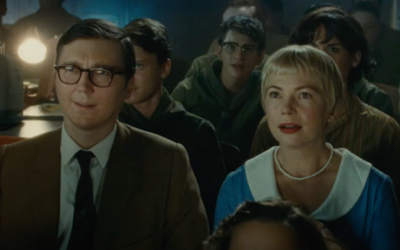While the usage of black-and-white cinematography has reduced dramatically over the decades due to the availability of color film, it is by no means an extinct technique. Oftentimes in modern cinema, showing a film in black-and-white can be quite beneficial in emphasizing a specific theme or concept. Some of the more famous examples of such films are Best Pictures Oscar winners “Schindler’s List”, in which director Steven Spielberg attempts to invoke a sense of historical realism, and “The Artist”, which pays homage to the Silent Era of Hollywood. The subject of today’s discussion takes a similar approach to Spielberg, but also uses black-and-white to reflect on people whose skin is literally black or white and their relations among one another, that film being the Kevin Willmott directed drama “Ninth Street”.
The film takes place in 1968 in the town of Junction City, Kansas (often referred to by residents as “Junk Town”), specifically in the location known as East Ninth Street. Although the street and its various nightclubs had showcased several prominent jazz musicians throughout the 1940’s, the prosperity could not last, and over two decades later, the area has been reduced to little more than a handful of cheap bars and strip clubs that military draftees from the nearby Fort Riley stop by for a quick moment of leisure. As the film delves deeper into how much East Ninth Street has changed over the years, several unique figures are introduced, ranging from a drunk World War II veteran who lost a leg in combat to a saloon owner who’s seen it all and wants nothing more than for her misery to end.
As the feature debut of writer-director Kevin Willmott, the film laid the groundwork for a career that, while not the most attention-grabbing, has proven mostly successful for the Kansas-born filmmaker. Most recently, his collaborations with Spike Lee have proven to be particularly noteworthy, having worked with Lee on such scripts as “Chi-Raq”, “BlacKkKlansman” (earning Willmott his first Oscar), and most recently, “Da 5 Bloods”. Of the many talented actors cast alongside Willmott, the most significant of the group includes Isaac Hayes, a prominent soul singer who wrote the Oscar-winning theme song of the film “Shaft” and also played the role of Chef on the animated sitcom “South Park”, and Martin Sheen, a prominent actor in both film and television, taking up prominent roles in the likes of “Apocalypse Now” and “The West Wing”.
It’s often said that one often needs to understand the past in order to pave the way for a brighter future, and there is no better film that demonstrates this than “Ninth Street”. Through its comparisons of the highs and lows that a single location has gone through over the course of its history, the film makes for an intriguing look into how times change and how difficult it can be for people to adapt to those changes, especially when race is an influential factor. Those interested to find out how can find the film here and see for themselves.




